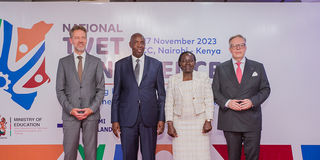Is Kenya’s TVET sector on the right path? Government official says it is, and explains why
Sponsored by GIZ

From left: Deputy German Ambassador to Kenya Alexander Fierley; Education Cabinet Secretary Ezekiel Machogu; Principal Secretary for TVET, Dr Esther Mworia; and Finnish Ambassador to Kenya Pirkka Tapiola, during the official opening of the National TVET Conference 2023 in Nairobi on November 15.
Education Cabinet Secretary (CS) Ezekiel Machogu has lauded Kenya’s technical and vocational education and training (TVET) sector for being on the right trajectory towards achieving a robust and strong industrial linkage.
The CS was a guest speaker at the opening of a three-day National TVET Conference 2023 at KICC, Nairobi, on November 15, 2023. He said the implementation of such linkages in the TVET sector was in line with the recommendations made by the Presidential Working Party on Education Reforms (PWPER).
The CS added that the dual training being implemented by a number of TVET institutions was the right thing to do towards ensuring that learners received realistic hands-on skills which would enable them fit easily in the job market of the day.
The Government is implementing the dual TVET through a partnership with the private sector and the German and Finland governments. The approach offers students a 50-50 mix of classroom training and industry exposure, making them not only well-rounded but also current on technical skills.
Thus, the Cabinet Secretary underscored the need for industries and TVET institutions to sustain elaborate and frequent communication between them on matters of curriculum development.
He at the same time noted that the Government was banking on the TVET sector to spur industrialisation in Kenya, and was therefore available to provide full support. “Failure in the TVET sector is not an option because it’s the main thing that the Government is banking on to spur industrialisation in Kenya,” the CS stated.
He called on TVET principals and industry liaison officers to be proactive in ensuring they identified industries within their locales and initiated lasting collaborations.
TVET Principal Secretary Dr Esther Muoria, echoing the CS statements, said: “Industry and TVET institutions should [operate as] one, to a point that no one can tell or notice any difference between the two.”
The PS pointed out that TVET institutions across the country had embraced the Competency-Based Education and Training (CBET), a curriculum that focuses on developing learners’ practical understanding of their training.
The Kenya School of TVET, the PS said, has been retooling TVET trainers to facilitate effective delivery of the CBET curriculum. Recently on November 13, the school, in partnership with the State Department for TVET, rolled out the retooling of trainers from 13 institutions that have been newly elevated to national polytechnics.


